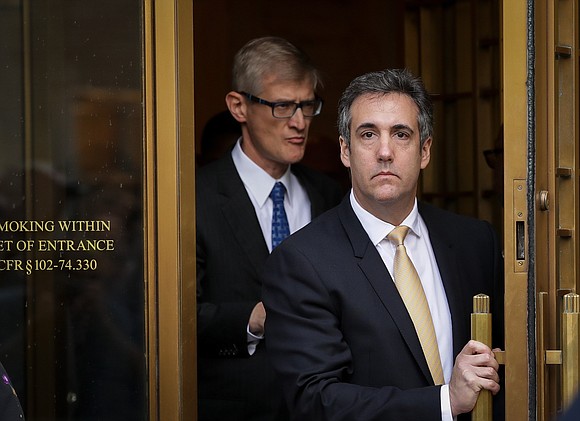How Michael Cohen could help the feds get the Trump Organization
CNN/Stylemagazine.com Newswire | 12/11/2018, 9:23 a.m.

By Erica Orden, CNN
(CNN) -- In most respects, Michael Cohen was a frustrating witness for New York investigators.
He toyed with, but wouldn't commit to, "full cooperation" with prosecutors, according to court filings. He refused to tell them about crimes for which he hadn't been charged. He wouldn't meet with them about "other areas of investigative interest." With officials in the state attorney general's office, he provided only corroboration for what they already knew, and with the state tax department, only what investigators could have obtained with a subpoena or two.
But there is one probe in the Manhattan US Attorney's office for which President Donald Trump's former personal attorney has proved helpful, according to court filings and people familiar with the matter: The investigation of the Trump Organization. That probe, and Cohen's participation in it, poses one of the most significant threats to the President's family business.
The investigation has been underway since before Cohen was first charged in August, CNN has reported, and is the subject of an ongoing grand jury investigation. The inquiry stems from the original campaign-finance charges against Cohen for making or orchestrating payments during the presidential campaign to silence women -- adult-film actress Stormy Daniels and former Playboy model Karen McDougal -- who claimed sexual encounters with Trump. (Trump has denied those claims.)
In the court papers filed against Cohen in August, and again last week, prosecutors referenced several unnamed Trump Organization executives and employees who directed or participated in a scheme to reimburse Cohen for the payments, and prosecutors have been examining whether people within the company should be charged as part of that effort.
An attorney for the Trump Organization, Alan Futerfas, declined to comment.
Through a series of false invoices for a non-existent retainer agreement, Cohen was handed a total of $420,000 by the company, including a $60,000 bonus, prosecutors said, and the company falsely recorded those payments as legal expenses. In fact, according to prosecutors, they were payments to compensate Cohen for the money he directed toward Trump's female accusers.
Within the company, only a handful of people had the authority to make such financial decisions, according to court depositions in other cases. Those people included the President, his adult children -- Eric, Donald Jr. and Ivanka Trump -- and the Trump Organization's chief financial officer, Allen Weisselberg.
In a 2015 deposition related to a lawsuit against Trump University, Weisselberg said only those five people had the authority to sign checks for the organization. "That seems to be the group that we've used over the last number of years to sign checks over all of our entities," Weisselberg said. He added, "Whether there's an exception to the rule, I'm not aware of it."
Prosecutors now appear to be building their case, an effort that began largely with an immunity agreement given to Weisselberg before Cohen was charged.
However, prosecutors have been reluctant to grant such protections to others at the company, according to a person familiar with the matter. A second employee of the company discussed a potential immunity deal with the US Attorney's office, but that employee ultimately didn't receive one.
After Cohen pleaded guilty, prosecutors questioned him about his knowledge of the reimbursements. In two meetings with New York federal prosecutors, Cohen was "forthright and credible," they said in court papers, and prosecutors noted that "the information he provided was largely consistent with other evidence gathered."
Special counsel Robert Mueller's office also said Cohen proved valuable to its probe of possible collusion between the Trump campaign and the Kremlin, disclosing "useful information concerning certain discrete Russia-related matters core to its investigation."
But that came in contrast to Cohen's interactions with other officials in New York. With the state attorney general's office, for example, the information Cohen offered "warrants little to no consideration as a mitigating factor" in his sentencing, set for Wednesday, prosecutors wrote in their filing last week.
One significant question Manhattan prosecutors may face if they find evidence of additional crimes within the Trump Organization is whether to charge individual employees or charge the company itself.
Prosecutors often weigh factors such as the pervasiveness of the wrongdoing and whether the company has been cooperative with the investigation. And prosecutors are often reluctant to charge an institution because of the impact such a step may have on employees who have committed no wrongdoing.
In the case of the Trump Organization, however, the company's nature as a family business whose identity is synonymous with that of the President and its corporate structure may cause prosecutors to view it differently.
"What makes this complicated here is that the Trump Organization is pretty closely bound up in one person, so it is not like a typical business where you might say, if we charge Arthur Andersen, 20,000 people might lose their jobs," said Harry Sandick, a former prosecutor in the Manhattan US Attorney's office, referring to the accounting firm that was effectively put out of business after it was charged as part of the Enron scandal. "So I think that that would weigh against some of the usual hesitancy in charging an institution."



